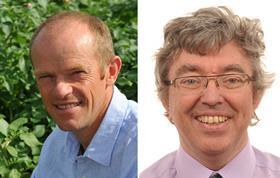
Two researchers based at the James Hutton Institute have been recognised for their contribution to plant science.
Professor Philip J White has been listed by Thomson Reuters as one of 176 Highly Cited Researchers in Plant and Animal Science over the period 2002-2012, while Dr David Cooke - who has worked on behalf of Potato Council - has been presented with the Royal Agricultural Society of England 2013 Research Medal, in recognition of ‘research work of outstanding merit carried out in the UK, which is proven or likely to be of benefit to agriculture.’
Thomson Reuters’ lists of Highly Cited Researchers contains over 3,000 researchers across 21 broad subject categories in life sciences, medicine, physical sciences, engineering and social sciences.
Professor White said: “It is a great achievement to be one of only 24 Scottish academics to be named on this list of the world’s leading scientists. I am honoured. However, since modern science is not the effort of any individual alone, credit should be shared with all my gifted collaborators, who have helped produce so many well-cited papers.”
On receiving the 2013 Research Medal from the Royal Agricultural Society of England, Dr Cooke said: “This recognition means a lot to me. I ventured on my career in agricultural research for both the intellectual challenge of discovery and the desire to convert scientific knowledge into practical benefits for the industry. It is very satisfying that I appear to have been successful in this conversion process.
“I would like to acknowledge Potato Council and the Scottish Government for support and funding, the contribution of many colleagues within the institute, collaborators across the world and, importantly those walking the fields and collecting potato blight samples.”
“Dr Cooke has been a stalwart of our Fight Against Blight campaign for almost a decade,” said Potato Council director, Rob Clayton. “He has a unique ability and commitment to making sure primary producers understand the significance of what can be at times a complex research outcome. His globally leading interest in understanding a changing blight population helps put GB on the front foot when responding to an ever-changing industry problem.”
Professor Iain Gordon, Chief Executive of the James Hutton Institute, congratulated both scientists and said: “This demonstrates that the James Hutton Institute is home to world class scientists. The excellent science that Professor White leads has been aptly recognised with his inclusion as a Highly Cited Researcher in plant and animal science, and Dr Cooke’s research on the genetics of the potato late blight pathogen helps keep the James Hutton institute at the forefront of the global challenge of developing biotechnology-based tools to tackle crop disease.”
Professor White graduated from Oxford University with a BA in biochemistry and was awarded a PhD in natural sciences (botany) from the University of Manchester. He has worked at the Universities of Edinburgh and Cambridge. Between 2006 and 2011, he led the successful Environment Plant Interactions Programme at the Scottish Crop Research Institute, a predecessor of the James Hutton Institute. He is currently engaged on projects addressing plant mineral nutrition, from the genes to the harvest.
A fist class honours graduate in agricultural botany and PhD in plant pathology from the University of Aberystwyth, Dr Cooke has been with the James Hutton Institute and its predecessor the Scottish Crop Research Institute since 1994 as a project leader in plant pathology. His main research interests include the development and exploitation of genetic markers for examining the population biology, epidemiology and management of Phytophthora infestans, the pathogen responsible for blight of potato, tomato and other related hosts.
Dr Cooke also co-ordinates pathogen data for the EuroBlight project, which examines populations of P. infestans in Europe, and his most recent paper (“Irish potato famine pathogen Phytophthora infestans originated in central Mexico rather than the Andes”) was published in Proceedings of the National Academy of Sciences of the United States.



